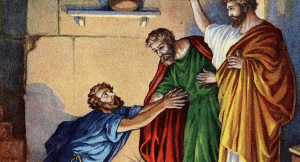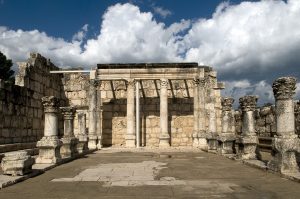In my previous blog post, after exploring some dead ends in our study of New Testament real estate law, we finally ended with an examination of biblical land laws, and how those laws applied to Levites. In this post, we’ll conclude our study of Ananias and Sapphira. To do so, we’ll look more closely at Barnabas, and why Luke, the author of Acts, brought him up in a story about Ananias and Sapphira. We’ll then determine what offense they committed that resulted in their death. Finally, we’ll consider how all of this relates to our Christian walk today.
Questions About Barnabas
When we began our study, we read that Barnabas was a Levite. In my last post, I discussed the differences in land laws as applied to Levites, on the one hand, or to Israelites from other tribes, on the other hand.
If the Old Testament land laws were still in place, as suggested by the Mishnah and discussed in my last post, then how are we to understand what Luke tells us about Barnabas?
Now Joseph, a Levite of Cyprian birth, who was also called Barnabas by the apostles (which translated means Son of Encouragement), and who owned a tract of land, sold it and brought the money and laid it at the apostles’ feet (Acts 4:36-37).
I checked the Expositor’s Bible Commentary, which had no definitive answer. It did suggest that the “regulation seems not always to have been observed,” pointing to Jeremiah’s symbolic purchase of land (Jeremiah 32:6-15). [Jeremiah was not only a prophet, but he was also a priest (Jeremiah 1:1). Since all priests, descended from Aaron (Numbers 3:2-3), were Levites (Exodus 4:14), Jeremiah was a Levite as well.]
The passage in Jeremiah, however, identifies the seller as Jeremiah’s cousin. Jeremiah’s land purchase, then, kept the property within the family and the tribe. The property may well have been pasture land around the city of Anathoth. On top of that, the transaction was symbolic, showing that the people of God would return to the Promised Land after 70 years in captivity. For all these reasons, this example should not be cited in support of the idea that the “regulation seems not always to have been observed.”
What Can We Say?
Unfortunately, this study has raised some questions for which we have not been able to find definitive answers. Even historians and scholars who have devoted their lives to studying the background of the New Testament do not know everything about the laws and customs and events within it.
However, the fact that we came up empty-handed this time should never stop us from asking lots of questions in our studies. (We cannot expect to find answers to all of our questions, especially when we become good at asking them!) The research we’ve done has given us a better picture of the early church, and we can now make a couple of conjectures about the property sales described in Acts.
First, it is doubtful that Barnabas or any of the other donors became homeless as a result of their gifts to the church. It is much more likely that they sold lands they did not personally plan to work. In the case of Barnabas, a Levite, the sale may well have been to a family member.
Second, the lands sold may not have been the only lands owned by the sellers. There is no reason to believe that anyone felt compelled to sell all of his or her property.
Third, some of the individuals who had traveled to Jerusalem from other nations may have sold properties in Judea still owned by their families. If they expected to return to their far-flung nations, they would have had no use for land in Judea.
On the other hand, travelers to Jerusalem might have decided to stay in Judea, taking the moment to sell their foreign holdings to other travelers from the same areas. These foreign lands, incidentally, would not have come under Old Testament land laws, which applied specifically to the Promised Land.
Why Mention Barnabas?
As I noted in the first post for this study, the narrator (Luke) seems to have been quite deliberate in placing the actions of Joseph, nicknamed Barnabas, immediately before those of Ananias and Sapphira. First he mentioned the generosity of unnamed individuals who sold their lands and other properties, donating the proceeds to the church. Then he mentioned Barnabas by name. Why?
The answer may have to do with the prominence of Barnabas in the early church. After this first reference, Luke mentions Barnabas 23 more times. That is more than he mentions any other apostle except Paul and Peter. In fact, most of the apostles are named just once, in the first chapter of Acts.
The second mention of Barnabas comes in the chapter Luke dedicates to the conversion of Saul, one-time persecutor of the church. The church was wary of Saul, also called Paul (Acts 13:9), not sure that he could be trusted. It was Barnabas who intervened on behalf of Saul, bringing him before the apostles (Acts 9:26-27).
At some point Barnabas became an apostle. Although we can’t be sure when this happened, it may be at the time when “prophets and teachers at Antioch” fasted and prayed for direction (Acts 13:1-3). The first time Luke actually calls Barnabas an apostle is in a reference to the work he and Paul were doing in Lystra during their first “missionary” journey (Acts 14:14).
It’s worth noting that Luke calls Joseph by his true name just once. In every other reference, he calls him Barnabas, probably because that is how he was known. The fact that Barnabas was better known as a son of encouragement tells us quite a bit about his personality and character. He was someone who really cared about others.
So why did Luke mention Barnabas before launching into the story of Ananias and Sapphira, and then not mention him again until chapter 9? Why Luke said no more about Barnabas is the easier part of the question to answer – the story was really about Ananias and Sapphira, not Barnabas.
So why mention him at all? Probably because many of Luke’s readers in the early church would have known of Barnabas. He was well known as a caring man, so his donation would have stood in stark contrast to the gift of Ananias and Sapphira.
What this means is that, although the story is true, Luke used Barnabas much like a literary foil. This is borne out by the use of a conjunction to introduce chapter 5. The first word is translated “But” (CJB, KJV, NASB, NKJV), “However” (CEB), and “Now” (MOUNCE), NIV), clearly connecting the end of chapter 4 with the beginning of chapter 5.
Why Did Ananias and Sapphira Have to Die?
As I noted at the end of my second post in this series, “Ananias and Sapphira were taking what rightfully belonged to their master – in this case, God!” I also asked how this could be true in light of Peter’s words recognizing that, “While it [the property being sold] remained unsold, did it not remain your own?” (Acts 5:4).
The most logical conclusion we can draw is that Ananias and Sapphira made some sort of public declaration of intent to give ALL the proceeds of the sale of their property to the church. This declaration would have been a vow, which was common in ancient Israel, and even into the first century.
The Encyclopedia of the Bible defines a vow as “a pledge or oath of a religious character, and a transaction between man and God, in which man dedicates himself or his service or something valuable to God.” Men and women often used vows to bargain with God. Among them were Jacob (Genesis 28:20-22), Jephthah (Judges 11:30-31), and Hannah (1 Samuel 1:11, 27-28).
Although God allowed His people to make vows, He warned them to be careful, and to fulfill their vows right away. The law also pointed out that it is not a sin to refrain from making vows (Deuteronomy 23:21-23). This statement amplifies the warning, essentially saying it is better not to vow than to make a vow but fail to fulfill it.
With this understanding of vows, we begin to gain a greater clarity in the various accusations against Ananias and Sapphira. Peter accused Ananias of “lying to the Holy Spirit” (Acts 5:3). Making a public declaration, or vow, and intentionally failing to fulfill it wholly is a lie.
Later Peter accused Sapphira of having “agreed together [with her husband] to put the Spirit of the Lord to the test” (verse 9). Since the vow was a promise made to God, Ananias and Sapphira were acting in such a way as to challenge God’s character and authority. They were putting Him to the test.
The concept of an unfulfilled vow also fits perfectly with the translation of the Greek nosphizō as both kept back and stealing. Ananias and Sapphira kept back a portion of what had been vowed, and as such, they were guilty of stealing from God.
Why Christians Should Take Note
Vows – at least not in the strictest sense – are uncommon in the modern world. There are, however, important vows that many, if not most, adults make. In addition, there are vows that all Christians make.
The first type is the wedding ceremony, in which couples solemnly vow to remain together “till death do us part” or “for as long as you shall live.” Since marriage is a God-ordained institution (Genesis 2:24), the wedding vow is as much a promise to God as it is a promise to one’s spouse. Jesus, when asked by the Pharisees about divorce, made it clear that God does not generally approve (Matthew 19:3-9).
The second vow to consider is baptism, through which believers solemnly promise allegiance to God, vowing to put “to death the deeds of the body” (Romans 8:13). Baptism itself is a symbol of death (Romans 6:3). By it the Christian commemorates the death of Christ on his / her behalf, but also promises to put to death the “old self” (Romans 6:6).
We should be sobered by the many promises associated with marriage, and with baptism. This does not mean we should avoid either, but we should do all in our power to fulfill our promises. We should be wholehearted in our approach to following Christ, and we should never “keep back” any part of what we have vowed to God.
My Next Post
For our next study, we’ll take a look at the transfiguration. All three synoptic gospels (Matthew, Mark, and Luke) include this event. John does not.
Although we will focus on the account in Matthew, it would be a good idea to spend some time looking at the parallel accounts in Mark and Luke. I suggest that in preparation for our study, you read Matthew 17:1-8 five or six times, jotting down any thoughts or questions that come to mind.
It’s also a good idea to read at least a few of the verses immediately preceding and following the passage we’re studying to see whether those verses include any context.




